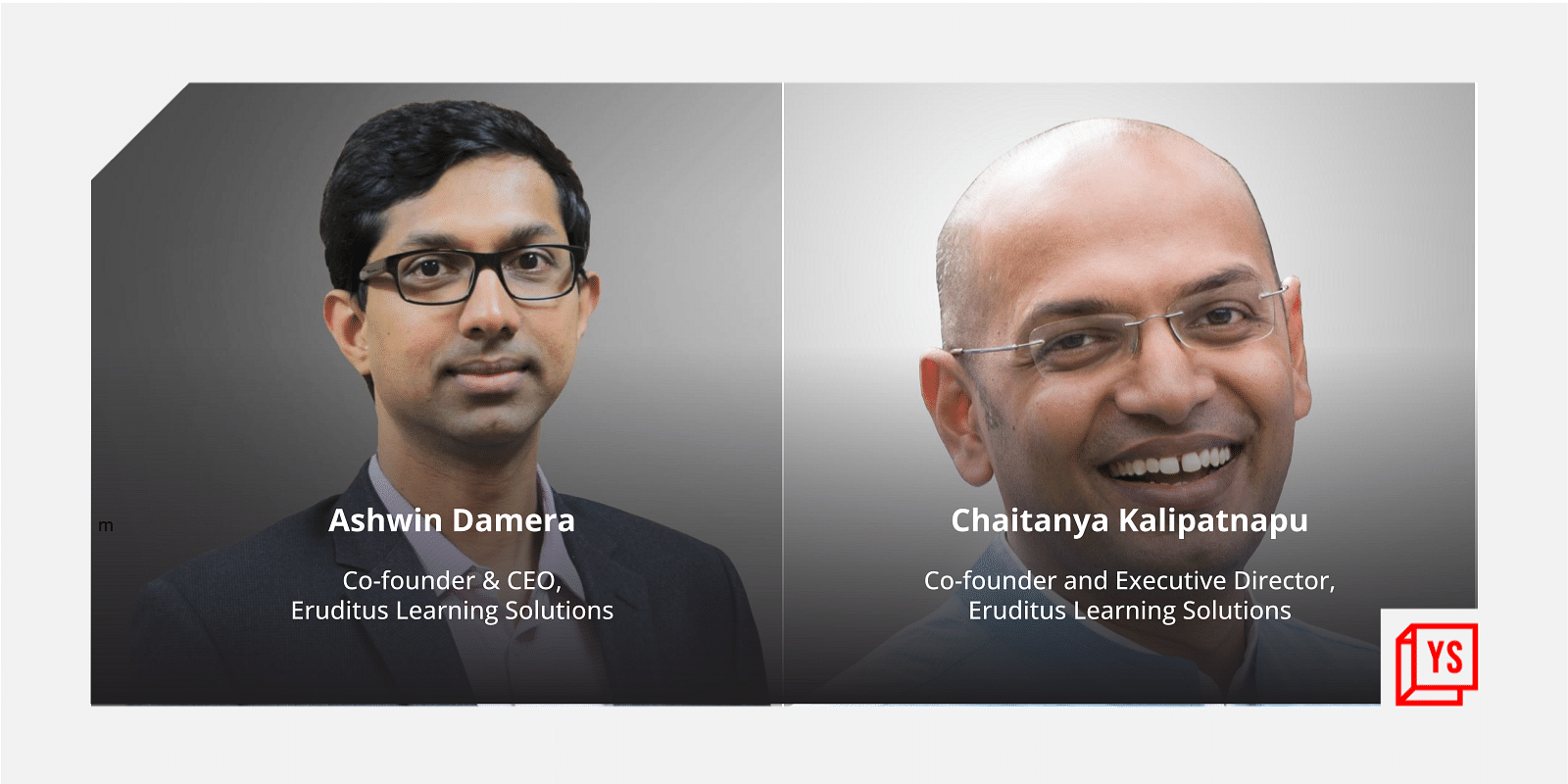Last week, online executive-education platform Emeritus got $350 million in debt-financing from CPP Investments to fund its mergers and acquisitions (M&A) over the next five years.
is part of the Group, founded by Ashwin Damera and Chaitanya Kalipatnapu in 2010, and last valued at $3.2 billion in August 2021.
While the Mumbai-headquartered edtech unicorn now has a war chest for M&A, its journey to gross $505 million in bookings for fiscal year ended June 2022 has been almost entirely organic. Its first acquisition only happened in May last year — iD Tech — for $200 million.
Eruditus’ growth has played out over a decade in the backdrop of MOOC (massive open online courses) platforms like , , and EdX.
,
While Coursera went public on the New York Stock Exchange a year ago, EdX got acquired by 2U. Their courses are built in partnership with universities, whereas Udacity has evolved into a technical training platform that partners with companies like Google.
The MOOC highway helped Coursera scale up to nearly 97 million registered learners — and, revenue of $415.3 million — in 2021. In contrast, Eruditus’ annual bookings of $505 million has come on the back of 3 million registered learners.
Eruditus calls its operating model ‘SPOC’ (small open private courses) that is focused on completion of courses in its learner base.
But what makes the company unique in the league of edtech unicorns from India like BYJU’S, Unacademy, and Vedantu is that much of Eruditus’ revenue growth has been driven by learners outside India.
Simply put, it is a global company unlike its Indian peers.
In fiscal year ended June 2021, Eruditus clocked annual bookings of $175 million. Of this, 36 percent came from the United States of America (US), 16 percent from Latin America, and 15 percent from Europe.
Effectively, two-thirds of Eruditus’ FY 2021 bookings were from the three regions, compared to 59 percent in FY 2020, and 52 percent in FY 2021.
This is the story of why and how Eruditus discovered its global learner base.
The early years
It took Eruditus five years to hone its product-proposition and learner experience in executive education. Between 2010 and 2015, it evolved as a service to enable classroom-learning of courses curated with leading universities across the world. Think INSEAD, Wharton, or Kellogg.
Founders Ashwin and Chaitanya were clear about who their customers were — working professionals. And there were three reasons for this.
One, working professionals had the disposable income to afford executive education. Two, it was more affordable for learners to study on Eruditus in India, than if they had to leave work to do a two-year course in any of the global universities. And three, the Eruditus experience helped students get certification from global universities on completion.
So, Ashwin and Chaitanya figured out how to work with the global universities to design on-premise executive-education programmes. It was a back-breaking process, but the duo was convinced that the courses would be valued by learners in India.
However, they faced a reality check in India in 2015: the number of students paying for the executive-education courses was still in three digits.
This meant if Eruditus had to maximise revenue for the courses it co-created with Ivy League universities, it had to think global. Think online — that was the only way.
Emeritus.org became the global face of its SPOC programmes. And the founders put their might behind making it an online learning platform for working professionals. They haven’t looked back since.
“For us, the advantage was that an MIT, Wharton, Harvard or UC Berkeley are already established brands. Our model had the inherent advantage to go global. So, we leveraged that,” recalls Ashwin Damera, CEO of Eruditus Learning Solutions.
More than 25 percent of its learner-enrolments in FY 2021 was from the US, followed by 19 percent from India, 16 percent from Latin America, and 14 percent from Europe.
In the past year, Eruditus has hired Charlie Schilling to head the US, Europe, and Canada markets, and Andrea Mansano to head the Latin America markets.
Coursera generates 50 percent of its $415-million revenue from the US, and 27 percent from Europe, Middle East and Africa. So, there is a lot of headroom still for Eruditus in the western markets.
“The biggest constraint in higher education is not on the demand side, but on the supply side,” says Ashwin. “It is very different from K-12, which has unlimited supply because they have enough tutors.”
That’s why Eruditus has worked on growing its online certificate courses by nearly 10 times in three years to 260 courses, online programmes by four times, and online degree courses by six times in a single year to 20.
In all, it has partnerships with 70 global universities to prepare 320 executive-education courses. Most of this work is done from India, which becomes a significant differentiator against Udacity and Coursera when it comes to scaling its production and delivery team.
For instance, Coursera reported 1,138 full-time employees in 2021. In contrast, around 1,500 employees (or two-thirds) of Eruditus’ 2,300-strong employee base is in India, with 400 people in Mexico, 200 in the US, and the rest spread out in China, West Asia, and Singapore.
“We have taken global to the next level,” Ashwin says. “Emeritus is not just about translating university courses from the US and Europe. Instead, we go into local markets, work with the local universities, have a local team market in local channels, and have a local context to the content and case studies.”
This means each geographic region of Eruditus can grow its global learner base by simply capitalising on the local universities in a region. In Latin America, Eruditus has worked with EGADE Business School, Tecnológico de Monterrey, and IPADE Business School in Mexico), and INCAE Business School in Costa Rica.
This becomes a huge draw for Emeritus.org learners in the local markets, where the brands are better known before they are discovered globally. In India, the Indian Institutes of Technology, Indian Institutes of Management, and XLRI can find a learner base from anywhere in the world when they are on Emeritus.
“Once we get a course and launch it, there is so much demand for a quality institution that there is enough of a pull factor to it,” Ashwin says. “Each market has nuances, topics, and other variations. To be successful, we need to have local leadership.”
Each market therefore has demands of the course that are unique. When Eruditus does a course with MIT for learners in the US, one-third of the material comprises recorded video-lectures, another one-third is live sessions, and the last third is applications, homework, projects, and so on.
Learners in India market, however, have a much higher preference for live teaching, especially in higher education.
“In fact, Indians are happy if we say, ‘log in for live classes on Saturday evening, from 5 PM to 8 PM (IST),” Ashwin told YourStory.
“Indian learners and faculty are happy to do live classes on weekends. But in the US, nobody will turn up on Saturday and Sunday,” Ashwin notes.
Eruditus has ensured more of live teaching for learners in India. Almost 80 percent is live teaching, and 20 percent is project work.
Similarly, in China, learners are extremely keen to know about the class composition for a course because of the networking opportunities. “We have to design the course based on the learning outcomes learners want,” Ashwin says.
But when he and Chaitanya began the Eruditus journey in 2010, they would have hardly imagined that the executive-education courses they designed would some day have to be curated by country. That’s how far Eruditus has come after 12 years.










![Read more about the article [Funding alert] Cora Health raises undisclosed amount from angel investors](https://blog.digitalsevaa.com/wp-content/uploads/2021/06/Imageid9w-1596617303202-1623047843998-300x150.jpg)